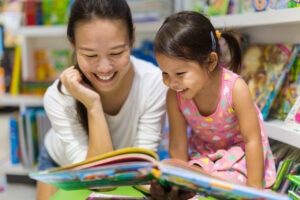BACK
Choosing the right kindergarten in Singapore for your preschool-age child can set the stage for their educational journey. As a parent, you want to ensure that the environment fosters growth, development, and a love for learning.
Before making a decision, it’s essential to be well-informed about the offerings of each kindergarten before you decide to enrol, and the key to acquiring the necessary information begins with asking the right questions.
In this article, we share some examples of what you should be asking and why.
Curriculum and teaching approach
Questions to ask:
- What is the curriculum structure?
- How is play incorporated into the learning process?
- Are there specific educational philosophies or approaches followed, such as Montessori, or traditional?
Understanding the curriculum structure and role of play in a kindergarten is fundamental to determining if the school aligns with your child’s needs and educational beliefs.
A curriculum’s structure will give you insight into the kindergarten’s teaching philosophy and whether it is compatible with your child’s learning style.
Play is also essential for young children’s development, fostering creativity, social skills, and problem-solving abilities. Do investigate how play is incorporated into the curriculum. A balanced approach that blends structured learning with play-based activities is ideal.
Class size and teacher-student ratio
Consider asking:
- What is the average class size?
- What is the teacher-student ratio?
A smaller class size and lower teacher-student ratio mean that each child receives more individualised attention from the teacher. They allow for personalised instruction, tailored support, and a greater focus on each child’s learning needs and progress.
With fewer students, teachers can engage more deeply with each child, fostering meaningful interactions and connections. Quality interactions can lead to a more supportive learning environment where children feel valued, heard, and understood.
Daily Schedule
Questions to ask:
- How is the day balanced between academic activities, playtime, and rest?
- Are there opportunities for outdoor play and exploration?
The daily schedule gives insight into how the kindergarten balances various daily activities, including academic instruction, playtime, rest periods, and meals.
A well-balanced schedule ensures children have opportunities for both structured learning and unstructured play, promoting holistic development. The kindergarten should also offer opportunities for outdoor play, which feeds a child’s curiosity and sense of exploration.
Staff qualifications and training
Questions to ask:
- What are the qualifications and credentials of the teaching staff?
- Do teachers receive ongoing professional development and training?
The qualifications and education of the teaching staff directly impact the quality of instruction your child receives. Teachers with relevant degrees, certifications, and training in early childhood education are better equipped to create engaging and developmentally appropriate learning experiences.
Kindergarten educators who have received formal training in child development can better understand young children’s unique needs and developmental milestones. They can tailor their teaching approaches to support each child’s growth across various cognitive, social, emotional, and physical domains.
Parental involvement
Questions to ask:
- What opportunities are available for parents to be involved in their child’s education?
Parental involvement provides opportunities to build meaningful relationships with teachers, staff, and other families within the kindergarten community. Establishing open lines of communication can build trust, facilitate productive partnerships and enhance your child’s overall experience.
Enrollment and fees
Questions to ask:
- What is the enrollment process, and when does it begin?
- What are the tuition fees, and are there additional costs for materials or activities?
Knowing the enrollment fees upfront and when to enrol allows you to budget and plan for your child’s education expenses promptly. Understanding the financial commitment involved ensures that there are no surprises later on and helps you make informed decisions about affordability.
You can also compare the costs of different kindergartens to determine which option offers the best value for your investment.
Deposit and refund policy
Questions to ask:
- Is a deposit required to secure a spot, and if so, how much?
- What is the refund policy in case of withdrawal or unforeseen circumstances?
Deposits are often required to confirm a child’s enrollment in a kindergarten. Knowing the deposit amount and deadline can ensure timely deposit submission and secure a spot in the programme, guaranteeing the child’s placement.
Knowing the deposit and refund policy offers financial protection if unexpected events necessitate withdrawing your child from kindergarten. Understanding the refund process ensures you can recover some or all of your deposit if needed, whether due to relocation, economic hardship, or other reasons.
Choose Little Skool-House Kindergarten for the best start
It’s always better to ask questions and know the necessary information for your child’s kindergarten enrollment than to be unprepared. Your child’s education and well-being deserve nothing less than your thorough consideration and commitment.
Little Skool-House is happy to answer any questions parents have about our teaching approach. We believe in a child-centric approach to learning, incorporating play-based activities and structured curriculum to foster a love for learning.
Your child’s well-being is our top priority. Our educators in Singapore are highly qualified and undergo continuous training to stay current with best practices in early childhood education.



